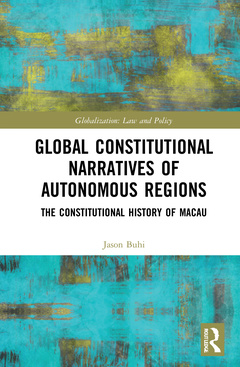Description
Global Constitutional Narratives of Autonomous Regions
The Constitutional History of Macau
Globalization: Law and Policy Series
Author: Buhi Jason
Language: English
Subjects for Global Constitutional Narratives of Autonomous Regions:
Keywords
Leal Senado; Foreign-language sources; Portuguese Macau; Chinese regime; Macau Portuguese; China's OCTS policy; Overseas Provinces; Chinese administration; Title Iii; Macau's unique constitutional development; Portuguese Administration; Colonial Administration; SPJD; UN; NPC; MSAR; Central Government; Chinese Community; Sino British Joint Declaration; MBL; Constitution Of The Portuguese Republic; Special Administrative Regions; Overseas Minister; Chinese Authorities; Chinese Government; CCP; Vice Prefect; Permanent Residents; Japan Voyage; Macau Residents
Publication date: 09-2022
Support: Print on demand
Publication date: 03-2021
· 15.6x23.4 cm · Hardback
Description
/li>Contents
/li>Readership
/li>Biography
/li>
With international attention focused on Hong Kong, many forget that Macau also exists in a delicate "one country, two systems" (OCTS) balance with mainland China. This book provides insights into the circumstances surrounding the less-understood half of China?s OCTS policy, including the stagnation of representational government, and the location of any Macau characteristics in the Macau Basic Law.
Despite being Hong Kong?s sister "Special Administrative Region" (SAR) within the People?s Republic of China, Macau?s unique constitutional development under Portuguese and Chinese administration remains under-appreciated despite its potential contributions to local, national, and international constitutional discourse. Utilizing a multidisciplinary approach, including doctrinal, historical, and comparative methodologies, this work fills that gap. The research blends Portuguese, Chinese, and foreign-language sources in order to reconstruct a balanced constitutional narrative. The book focuses on a consequential effect of globalization ? that is, the assimilation of a long-standing and unique constitutional order by a new hegemonic sovereign ? including processes for internationalization as China opened up, legal harmonization of two distinct legal and socioeconomic orders, juridification of local affairs with the establishment of a new local court system in preparation for handover to the Chinese regime, and democratization (or the lack thereof) among the various communities comprising the Macanese polity before and since.
Focusing on Macau?s unique development at the crux of European and Chinese empires, and the role it plays as a mirror for Chinese intentions vis-a-vis Hong Kong today, the book will be of interest to those working in constitutional law, politics, and history.
Chapter 1: The Entrepȏt of Eurasia (1553 – 1622)
Chapter 2: The Democratic Citadel (1623 – 1783)
Chapter 3: The Era Of Imperial Consolidation (1783 – 1845)
Chapter 4: The Early Colonial Era (1846 – 1909)
Chapter 5: The Middle Colonial / Republican Period (1910 – 1930)
Chapter 6: The Late Colonial Period (1930 – 1966)
Chapter 7: The Handover Era (1966 – 1999)
Chapter 8: The Special Administrative Region (1999 – 2049)
Epilogue
Jason Buhi is an assistant professor at Barry University’s Dwayne O. Andreas School of Law in Orlando, Florida, where he teaches courses in constitutional law and election law. Prior to that, he earned his Ph.D. from the University of Hong Kong Faculty of Law and taught at the Peking University School of Transnational Law in Shenzhen. Professor Buhi was first introduced to Hong Kong and Macau as a Rotary International Ambassadorial Scholar.




